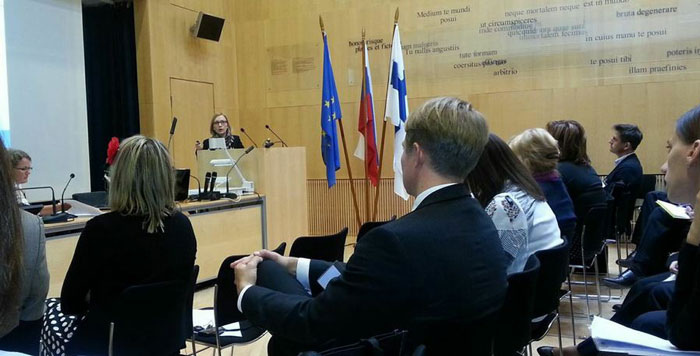The Climate Smart Regional Planning workshop was organized in St. Petersburg, Russia 3-5 September 2014 for launching cooperation on regional climate strategies in the Barents region. The Barents Euro-Arctic Council (BEAC) is promoting and organizing collaboration in the Barents region so that all Barents member regions would have climate strategies.
The climate strategy work in the Barents region was started during Finland’s chairmanship of the BEAC Working Group on Environment (WGE) in 2012-2013. Climate issues are one of the five top tasks during the Russian chairmanship of the WGE during the years 2014-2015. This includes the development of regional climate strategies in the Barents region, as planned in the Action Plan on Climate Change for the Barents Region (2013).

Collaboration in order to find out the most pressing questions in formulating climate strategies. Photo: Ilona Mettiäinen, Arctic Centre, University of Lapland
In the Climate Smart workshop, experiences were shared between Barents member regions in order to learn from each other and contacts were made between regional actors. I gave two presentations in the workshop: the first one about climate change as a challenge for strategic planning from methodological and knowledge related viewpoint, with the headline “Promises and challenges of strategic planning in climate change work”. My second presentation dealt with the collaborative planning process of the regional climate strategy of Finnish Lapland. Both presentations were based on my ongoing doctoral research in which I study strategic planning as a method in knowledge-intensive planning and policy-making processes and the regional level in climate adaptation and mitigation work. For the research, I observed the formulation process of Lapland’s regional climate strategy in 2010-2012.
The workshop gathered over 30 professionals such as regional authorities, greenhouse gas and land-use planning experts, researchers, and other focal stakeholders in regional climate work to brainstorm and collaborate.
It turned out that several Barents member regions, that had already completed preparing their climate strategies, shared many similar experiences regarding processual or “framework” issues. Some similarities could be spotted also regarding content related issues, as the climatic and other natural conditions in the Barents region are somewhat similar, as well as the projected climatic changes. Also the importance of natural resources for regional economies unites the Barents regions. However, as adaptation is highly a region specific issue due to differences in community, livelihood and land-use structures as well as planning and administrational cultures, all best practices identified in one region cannot be applied directly as such in all other Barents regions.
Some lessons to take home included the need to organize collaboration from a very early stage, instead of just asking for comments for a draft version of a nearly finished strategy document. Crucial questions for the region that should be addressed in the climate strategy could be identified in the very beginning from local experts and practitioners, as Lapland did. It would also be a good idea to make a communications plan in order to insure involvement of local inhabitants, politicians and enterprises.
The third day of the Climate Smart workshop consisted of a collaborative “clinic” in which concerns and questions about different stages and problems in making regional climate strategies were discussed together. The workshop was led by Jaana Sorvali and me. In the beginning, the most important issues to discuss were identified by collaborative working methods by asking the participants to list their most important concerns which were then elaborated. The top three issues of concern proved out to be the financing of the climate strategy work, stakeholder involvement and the implementation of the strategy. Also data collection issues were addressed. In the discussion, experiences and recommendations based on cases from different parts of the Barents region were shared.
The importance of sufficiently intensive and wide collaboration with regional stakeholders was underlined, but also governance related methods were seen essential. For successful implementation, climate viewpoints should be spread from the climate strategy also to other planning and decision-making. Particularly land-use planning can help to reduce or to limit the growth of greenhouse gas emissions from e.g. commuting and other transport.

Ilona Mettiäinen giving a presentation at the workshop on 3 September 2014. Photo: Tuuli Ojala, BEAC / Barents Secretariat
Text: Ilona Mettiäinen